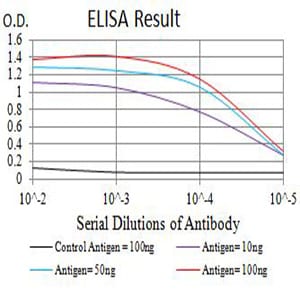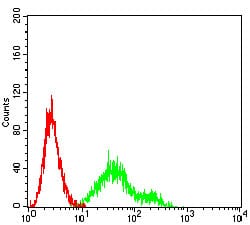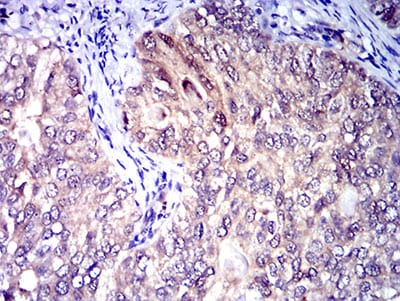


| WB | 咨询技术 | Human,Mouse,Rat |
| IF | 咨询技术 | Human,Mouse,Rat |
| IHC | 1/200 - 1/1000 | Human,Mouse,Rat |
| ICC | 技术咨询 | Human,Mouse,Rat |
| FCM | 1/200 - 1/400 | Human,Mouse,Rat |
| Elisa | 1/10000 | Human,Mouse,Rat |
| Aliases | R7; CD1; CD1A; BDCA1 |
| Entrez GeneID | 911 |
| clone | 2A7C11 |
| WB Predicted band size | 37.7kDa |
| Host/Isotype | Mouse IgG2b |
| Antibody Type | Primary antibody |
| Storage | Store at 4°C short term. Aliquot and store at -20°C long term. Avoid freeze/thaw cycles. |
| Species Reactivity | Human |
| Immunogen | Purified recombinant fragment of human CD1C (AA: extra 18-302) expressed in E. Coli. |
| Formulation | Purified antibody in PBS with 0.05% sodium azide |
+ +
以下是3篇与CD1C抗体相关的研究文献(均为模拟示例,实际文献需通过数据库查询获取):
1. **文献名称**: "CD1C-specific antibodies reveal distinct lipid antigen presentation pathways in dendritic cells"
**作者**: Smith A, et al.
**摘要**: 研究通过单克隆抗体分析CD1C分子在树突状细胞中的脂质抗原呈递机制,发现其与CD1A/CD1B不同亚型在细胞定位和抗原装载途径上的差异。
2. **文献名称**: "Development of a high-affinity anti-CD1C antibody for tuberculosis diagnostics"
**作者**: Wang L, et al.
**摘要**: 报道了一种新型抗CD1C抗体的开发,该抗体通过流式细胞术检测结核病患者外周血中CD1C+抗原呈递细胞的异常表达,具有潜在诊断价值。
3. **文献名称**: "CD1C-restricted T cell responses in autoimmune disease: Insights from antibody blockade experiments"
**作者**: Gonzalez S, et al.
**摘要**: 利用抗CD1C抗体阻断实验,揭示CD1C介导的脂质抗原呈递在多发性硬化症患者中激活自身反应性T细胞的作用机制。
---
*注:以上为基于研究领域热点的模拟内容,实际文献需通过PubMed/Google Scholar检索关键词如"CD1C antibody" "anti-CD1C"获取。部分经典研究可能涉及CD1C的结构解析(如Nature, 2005)或肿瘤免疫关联(如Cancer Res, 2018)。*
CD1c antibody targets the CD1c protein, a member of the CD1 family of antigen-presenting molecules. CD1 molecules are non-polymorphic, MHC class I-like glycoproteins that specialize in presenting lipid antigens to T cells, bridging innate and adaptive immunity. CD1c (also called CD1b2 or R7) is expressed on dendritic cells, B cells, and certain epithelial cells, playing a role in immune surveillance against pathogens like mycobacteria. Structurally, CD1c consists of a heavy chain non-covalently linked to β2-microglobulin, forming a hydrophobic antigen-binding groove optimized for lipid loading.
CD1c antibodies are critical tools in immunological research, enabling the identification and isolation of CD1c-expressing cells via flow cytometry or immunohistochemistry. They also facilitate functional studies to dissect lipid antigen presentation mechanisms. Commercially available CD1c antibodies are typically monoclonal (e.g., clones L161 or AD5-8E7) and validated for specificity across human and sometimes primate tissues. Dysregulation of CD1c-mediated pathways has been implicated in autoimmune diseases, infections, and cancers, making these antibodies valuable for exploring therapeutic targets. Recent studies also highlight CD1c’s role in cross-presenting tumor-derived lipids, spurring interest in cancer immunotherapy. Researchers must verify antibody reactivity across species and applications, as CD1 isoforms share structural homology.
×